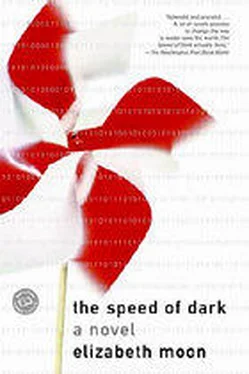Simon shakes his hand and says, “Anytime.”
I do not know whether to put out my hand or not, but Simon quickly offers his so I shake it even though I do not like to shake hands — it seems so pointless — and then he says, “Thanks, Lou; I enjoyed it.”
“Anytime,” I say. There is a moment’s tension in the room, and I am worried that I said something inappropriate — even though I was copying Tom and Max — and then Simon taps my arm with his finger.
“I hope you change your mind about tournaments,” he says. “It was a pleasure.”
“Thank you,” I say.
While Simon goes out the door, Max says, “I have to leave, too,” and Susan uncoils from the floor. It is time to leave. I look around; all the faces look friendly, but I thought Don’s face looked friendly. If one of them is angry with me, how would I know?
On Thursday we have the first of the medical briefings where we have been able to ask the doctors questions. There are two doctors, Dr. Ransome, with the curly gray hair, and Dr. Handsel, who has straight dark hair that looks as if it had been glued onto his head.
“It is reversible?” Linda asks.
“Well… no. Whatever it does, it does.”
“So if we don’t like it, we can’t go back to being our normal selves?”
Our selves are not normal to start with, but I do not say that aloud. Linda knows it as well as I do. She is making a joke.
“Er… no, you can’t. Probably. But I don’t see why—”
“I’d want to?” Cameron says. His face is tense. “I like who I am now. I do not know if I will like who I become.”
“It shouldn’t be that different,” Dr. Ransome says.
But every difference is a difference. I am not the same person as before Don began to stalk me. Not only what he did but meeting those police officers has changed me. I know about something I didn’t know before, and knowledge changes people. I raise my hand.
“Yes, Lou,” Dr. Ransome says.
“I do not understand how it can not change us,” I say. “If it normalizes our sensory processing, that will change the rate and kind of data input, and that will change our perceptions, and our processing—”
“Yes, but you — your personality — will be the same, or much the same. You will like the same things; you will react the same—”
“Then what’s the change for? ” Linda asks. She sounds angry; I know she is more worried than angry. “They tell us they want us to change, to not need the supports we need — but if we do not need them, then that means our likes and dislikes have changed… doesn’t it?”
“I’ve spent so much time learning to tolerate overload,” Dale says. “What if that means I suddenly don’t pick up on things I should?” His left eye flickers, ticcing wildly.
“We don’t think any of that will happen,” the doctor says again. “The primatologists found only positive changes in social interaction—”
“I’m not a fucking chimp!” Dale slams his hand down on the table. For a moment his left eye stays open; then it starts ticcing again.
The doctor looks shocked. Why should he be surprised that Dale is upset? Would he like to have his behavior presumed on the basis of a primatologist’s studies of chimpanzees? Or is this something normals do? Do they see themselves as just like other primates? I can’t believe that.
“No one’s suggesting you are,” the doctor says, in a slightly disapproving voice. “It’s just that… they’re the best model we have. And they had recognizable personalities after treatment, with only the social deficits changed…”
All the chimps in the world now live in protected environments, zoos, or research establishments. Once they lived wild, in the forests of Africa. I wonder if the autistic-like chimpanzees would have been that way in the wild or if the stress of living as prisoners has changed them.
A slide lights up the screen. “This is the normal brain’s activity pattern when picking a known face from a photograph of several faces,” he says. There is a gray outline of a brain, with little glowing green spots. Thanks to my reading, I recognize some of the locations… no, I recognize the slide. It is illustration l6-43.d, from chapter 16 of Brain Functionality . “And here—” The slide changes. “This is the autistic brain’s activity pattern during the same task.” Another gray outline with little glowing green spots. Illustration 16-43.C from the same chapter.
I try to remember the captions in the book. I do not think that the text said the first was normal brain activity when picking a known face from a photographed group. I think it was normal brain activity when viewing a familiar face. A composite of… yes, I remember. Nine healthy male volunteers recruited from college students according to a protocol approved by the human ethics research committee…
Another slide is already showing. Another gray outline, another set of colored splotches, these blue. The doctor’s voice drones on. This is another slide I recognize. I struggle to remember what the book said and hear what he is saying, but I cannot. The words are tangling.
I raise my hand. He stops and says, “Yes, Lou?”
“Can we have a copy of this, to look at later? It is hard to take in all at once.”
He frowns. “I don’t think that’s a good idea, Lou. This is still proprietary — very confidential. If you want to know more, you can ask me or your counselor questions and you can look at the slides again, though” — he chuckles — “I don’t think they’ll mean much since you’re not a neurologist.”
“I’ve read some,” I say.
“Really…” His voice softens to a drawl. “What have you read, Lou?”
“Some books,” I say. Suddenly I do not want to tell him what book I have been reading, and I do not know why.
“About the brain?” he asks.
“Yes — I wanted to understand how it worked before you did anything with the treatment.”
“And… did you understand it?”
“It’s very complicated,” I say. “Like a parallel-processing computer, only more so.”
“You’re right; it’s very complicated,” he says. He sounds satisfied. I think he is glad I did not say I understood it. I wonder what he would say if I told him that I recognize those illustrations.
Cameron and Dale are looking at me. Even Bailey gives me a quick glance and looks away. They want to know what I know. I do not know if I should tell them, partly because I do not yet know what I know — what it means in this context.
I put aside thoughts of the book and just listen, meanwhile memorizing the slides as they come and go. I do not take in information as well this way — none of us do — but I think I can retain enough to compare it to the book later.
Eventually the slides change from gray outlines of brains with colored spots to molecules. I do not recognize them; they are not anything in the organic chemistry book. But I do recognize a hydroxy group here, an amino group there.
“This enzyme regulates gene expression of neural growth factor eleven,” the doctor says. “In normal brains, this is part of a feedback loop that interacts with attention control mechanisms to build in preferential processing of socially important signals — that’s one of the things you people have a problem with.”
He has given up any pretense that we are anything but cases.
“It’s also part of the treatment package for autistic newborns, those who weren’t identified and treated in utero, or for the children who suffer certain childhood infections that interfere with normal brain development. What our new treatment does is modify it — because it functions like this only in the first three years of development — so that it can affect the neural growth of the adult brain.“
Читать дальше












